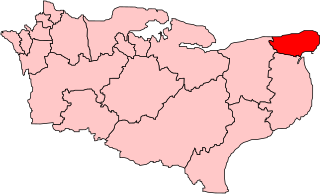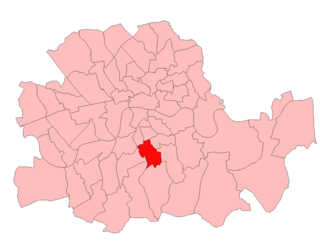
Joseph King (31 March 1860 – 25 August 1943), was a British Liberal Party politician who later joined the Labour Party.

Joseph King (31 March 1860 – 25 August 1943), was a British Liberal Party politician who later joined the Labour Party.
He was the eldest son of Joseph King of Liverpool and his wife Phoebe (née Powell). He was educated at Uppingham School, Trinity College, Oxford, (where he was awarded a BA in 1883 and an MA in 1886) [1] Airedale College, Bradford, University of Giessen and University, Berlin. He married, in 1887, Maude Egerton. They had one daughter. [2] He was called to the bar at the Inner Temple in 1889. [3] Maude died in 1927. He married for a second time in 1928, to Helena G. Martins. [4]
King was Liberal candidate for the New Forest Division of Hampshire at the 1892 General Election, coming second. [5]
| Party | Candidate | Votes | % | ±% | |
|---|---|---|---|---|---|
| Conservative | Hon. John Walter Edward Douglas-Scott-Montagu | 4,481 | 54.6 | n/a | |
| Liberal | Joseph King | 3,726 | 45.4 | n/a | |
| Turnout | 8,207 | 81.0 | n/a | ||
| Majority | 755 | 9.2 | n/a | ||
| Conservative hold | Swing | n/a | |||
He did not contest the 1895 and 1900 General Elections. In 1904 he contested the 1904 Isle of Thanet by-election as a Liberal Party candidate, coming second. At the 1906 General Election he was Liberal candidate again at Thanet, coming second.
At the January 1910 General Election, King was elected Liberal MP for North Somerset , holding a seat for the party that was gained from the Conservatives in 1906. He was re-elected in December 1910.
Following the outbreak of World War I, King joined the Union of Democratic Control, a group of Liberal and Labour politicians who were critical of the secret diplomacy that they blamed for the conflict. He argued that Britain was obliged to protest at the German invasion of Belgium but not to go to Belgium's aid. He was a pacifist and opposed military conscription. [7] His constituency was abolished as part of the 1918 boundary changes.
He was sympathetic to the Bolsheviks, raising the matter of Trotsky's 1917 detention in a debate in 1918:
"Mr. KING asked the Secretary of State for Foreign Affairs whether he is aware that after the Russian revolution Mr. Trotsky was arrested by British authorities and placed in a camp with German prisoners at Halifax; that he was charged with being a German agent; and whether, in order to remove any ground for suspicion or he will now instruct our Ambassador or Chargé d'Affaires in Petrograd to convey to Mr. Trotsky the British Government's regret for this incident?
"Mr. BALFOUR: Mr. Trotsky was detained at Halifax on suspicion of being a German agent. The answer to the last part of the question is in the negative." [8]
In 1919 he published a pamphlet called Three Bloody Men, in which he blamed the Whites for starting the violence and condemned the British government for encouraging them. Denounced the Whites for having removed the lawful Provisional Government and alienated many anti-Bolsheviks. [9]

In 1920 he contested the 1920 Ilford by-election as a Labour Party candidate.
| Party | Candidate | Votes | % | ±% | |
|---|---|---|---|---|---|
| Coalition Conservative | Fredric Wise | 15,612 | 54.4 | −12.4 | |
| Labour | Joseph King | 6,577 | 22.9 | +3.4 | |
| Liberal | John William Howard Thompson | 6,515 | 22.7 | +8.9 | |
| Majority | 9,035 | 31.5 | |||
| Turnout | 28,704 | ||||
| Coalition Conservative hold | Swing | ||||
At the 1923 General Election King was Labour candidate at York, coming second. [11]
In 1933 he published The German revolution, its meaning and menace, warning about Hitler.
King played a key role in the Peasant Arts movement in Haslemere, Surrey. A number of the items produced are in the Victoria and Albert Museum.
British Pathe has newsreel footage of King standing outside the Ilford election count.

Isle of Thanet was a county constituency which returned one Member of Parliament (MP) to the House of Commons of the Parliament of the United Kingdom from 1885, until it was abolished for the February 1974 general election.
Burslem was a borough constituency in Stoke-on-Trent which returned one Member of Parliament (MP) to the House of Commons of the Parliament of the United Kingdom. Elections were held using the first past the post voting system.
Ilford was a borough constituency in what is now the London Borough of Redbridge in eastern Greater London. It returned one Member of Parliament (MP) to the House of Commons of the Parliament of the United Kingdom. It was created for the 1918 general election, and abolished for the 1945 general election, when it was replaced by the new Ilford North and Ilford South constituencies.
Edward Albert Lessing OBE was a British corn trader, Liberal Party politician and an early authority on Soviet Russia.

Alfred Henry Scott was a British Liberal politician.
The 1933 Altrincham by-election was a parliamentary by-election held on 14 June 1933 for the British House of Commons constituency of Altrincham in Cheshire.
The 1919 Aberdeenshire and Kincardine Central by-election was a parliamentary by-election held for the British House of Commons constituency of Aberdeenshire and Kincardineshire Central on 16 April 1919.
The 1945 Neath by-election was a parliamentary by-election held for the British House of Commons constituency of Neath in South Wales.
The 1932 Cardiganshire by-election was a parliamentary by-election held on 22 September 1932 for the British House of Commons constituency of Cardiganshire.
The 1919 St Albans by-election was a parliamentary by-election held in England in December 1919 for the House of Commons constituency of St Albans in Hertfordshire.

The Ilford by-election of 25 September 1920 was held after the death of the Coalition Unionist Member of Parliament Sir William Peter Griggs. The Coalition retained the seat in the by-election.
The 1919 Manchester Rusholme by-election was a parliamentary by-election held in October 1919 for the British House of Commons constituency of Manchester Rusholme. The by-election was important for shaping the future Labour Party attitude to electoral relations with the Liberal Party.
The 1919 Isle of Thanet by-election was a parliamentary by-election for the British House of Commons constituency of Isle of Thanet on 15 November 1919.

The Revolutions of 1917–1923 were a revolutionary wave that included political unrest and armed revolts around the world inspired by the success of the Russian Revolution and the disorder created by the aftermath of World War I. The uprisings were mainly socialist or anti-colonial in nature. Most socialist revolts failed to create lasting socialist states. The revolutions had lasting effects in shaping the future European political landscape, with, for example, the collapse of the German Empire and the dissolution of Austria-Hungary.

The 1938 Aylesbury by-election was a parliamentary by-election for the British House of Commons constituency of Aylesbury on 19 May 1938.

The 1928 Ilford by-election was a parliamentary by-election for the British House of Commons constituency of Ilford, London on 23 February 1928.

The 1923 Whitechapel and St Georges by-election was a parliamentary by-election for the British House of Commons constituency of Whitechapel and St Georges on 8 February 1923.

The 1920 Camberwell North West by-election was a parliamentary by-election held for the British House of Commons constituency of Camberwell North West in the South London district of Camberwell on 31 March 1920.

Terrorism and Communism: A Reply to Karl Kautsky‹See Tfd›German: Terrorismus und Kommunismus: Anti-Kautsky; Russian: Терроризм и Коммунизм, Terrorizm i Kommunizm) is a book by Soviet Communist Party leader Leon Trotsky. First published in German in August 1920, the short book was written against a criticism of the Russian Revolution by prominent Marxist Karl Kautsky, who expressed his views on the errors of the Bolsheviks in two successive articles, Dictatorship of the Proletariat, published in 1918 in Vienna, Austria, followed by Terrorism and Communism, published in 1919.
The 1904 Isle of Thanet by-election was held in the UK Parliament constituency of the Isle of Thanet on 7 October 1904, following the death of Conservative Party MP James Lowther. It was successfully defended for the Conservative party by Harry Marks.